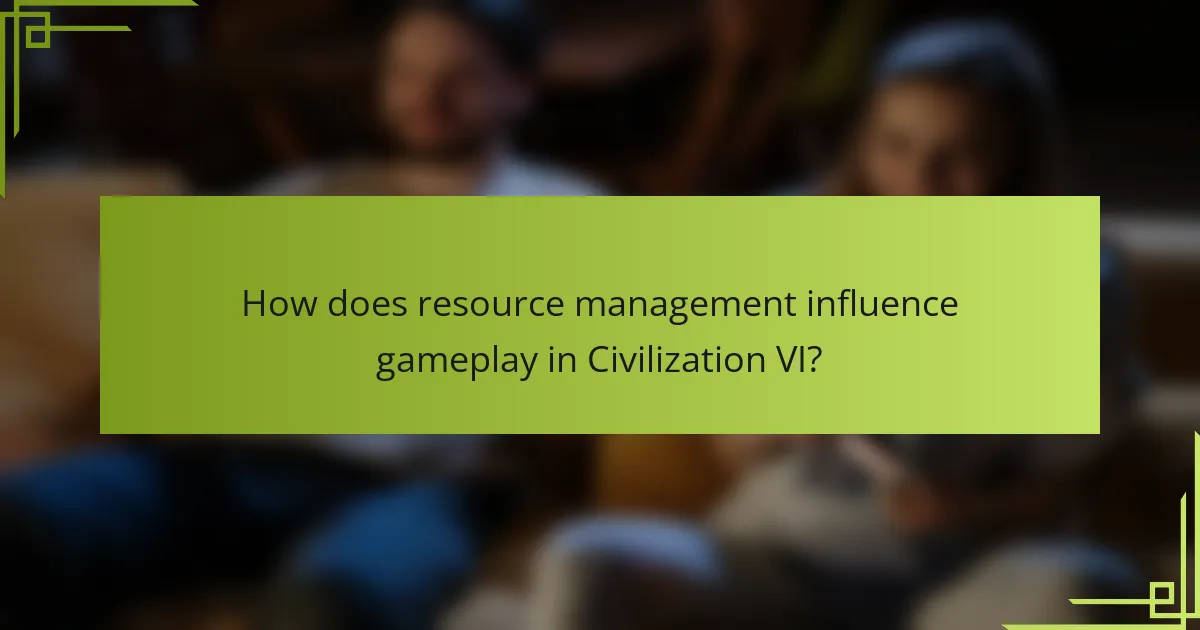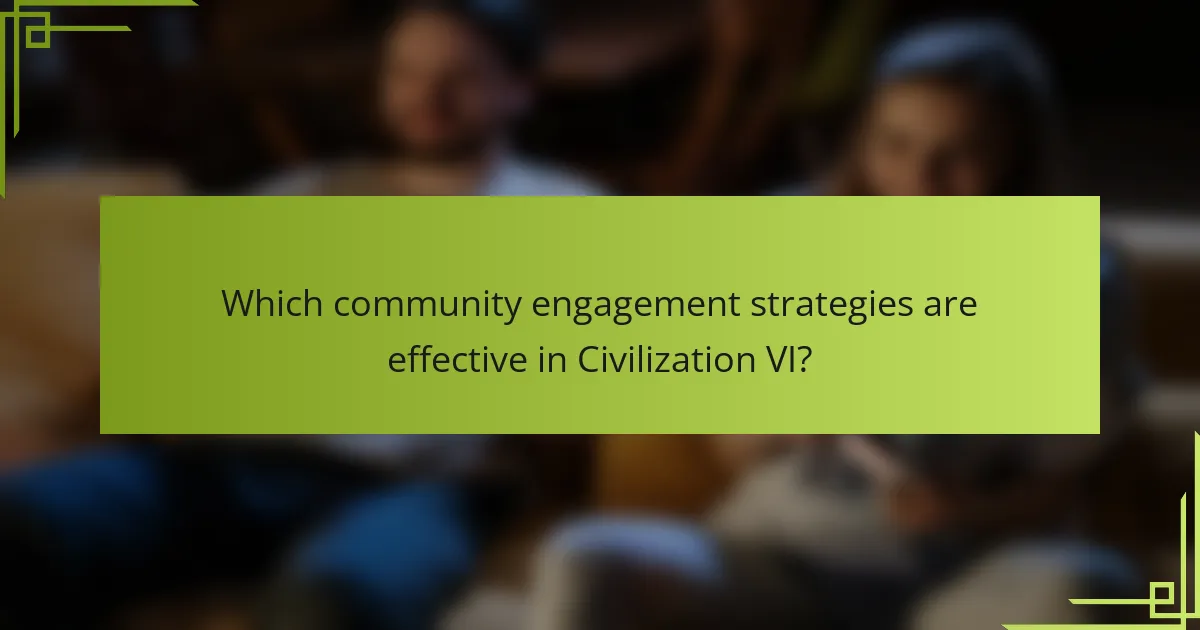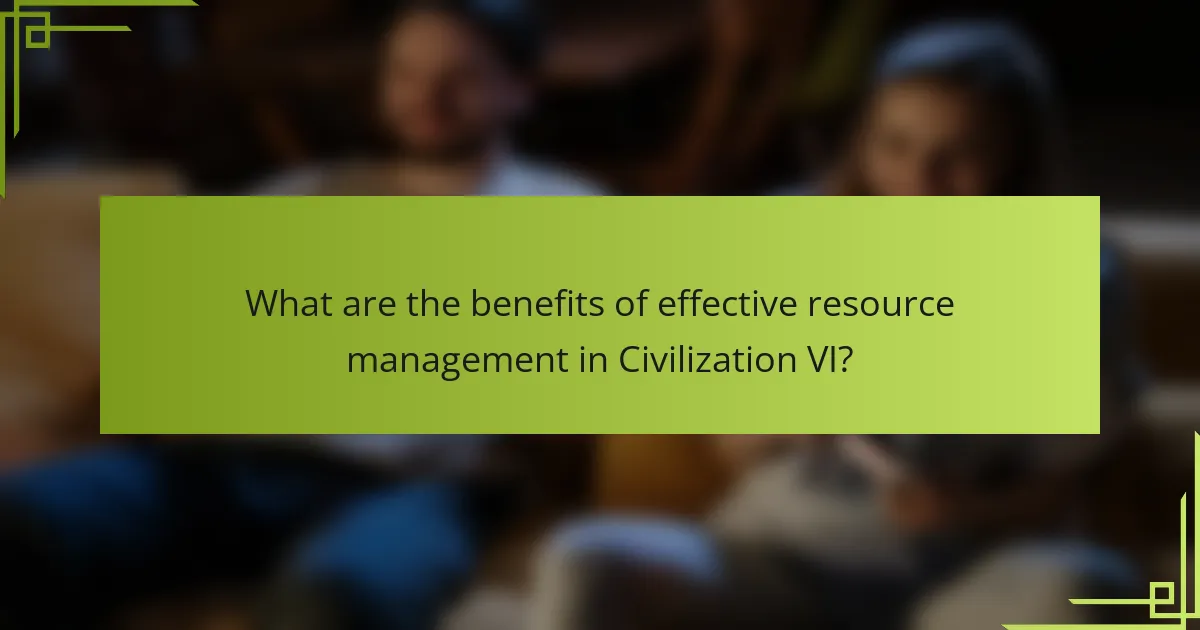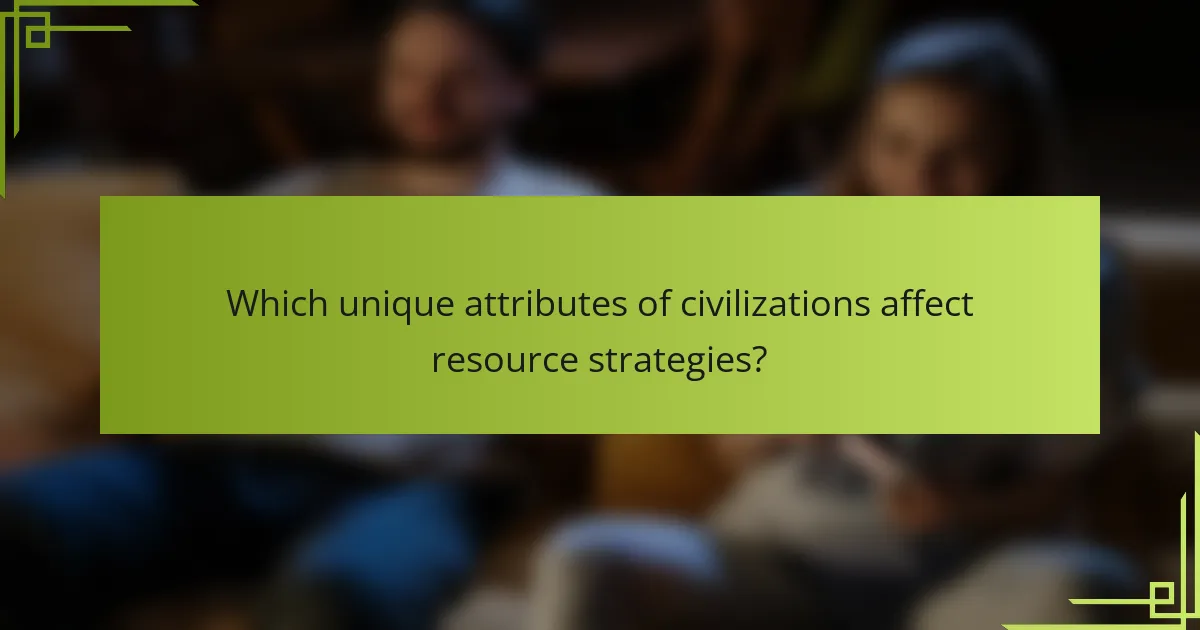Effective resource management and community engagement are crucial for success in Civilization VI. This article explores strategies for optimizing resource allocation, forming alliances, establishing trade routes, and utilizing diplomatic relations. Understanding unique civilization attributes will help tailor approaches for sustainable growth and competitive advantage. Engaging with the community enhances collaboration and resource sharing, leading to improved gameplay outcomes.

How does resource management influence gameplay in Civilization VI?
Resource management significantly impacts gameplay in Civilization VI by determining a player’s ability to expand, develop, and maintain their civilization. Efficient management of resources like food, production, and gold directly influences growth and military strength. Players who optimize resource allocation can enhance their civilization’s technology and culture, leading to strategic advantages. Additionally, effective community engagement through trade and diplomacy can further enhance resource management, fostering alliances that provide access to critical resources.
What are the key resources in Civilization VI?
Key resources in Civilization VI include food, production, gold, science, culture, and faith. Each resource plays a crucial role in developing cities and advancing civilization.
Food sustains population growth, while production determines the speed of building units and structures. Gold is essential for trade and maintaining armies. Science drives technological advancement, culture influences civic policies, and faith supports religious activities.
Effective management of these resources is vital for strategic gameplay and community engagement. Balancing resource acquisition and allocation enhances overall performance in the game.
How do different civilizations utilize resources?
Civilizations utilize resources through strategic management and community engagement to enhance sustainability and growth. In Civilization VI, players can optimize resource use by focusing on agriculture, trade, and technology.
Effective resource management involves prioritizing food production, which sustains population growth. Players can establish farms and utilize irrigation to increase yield. Trade routes facilitate resource exchange, boosting economic development and fostering alliances.
Community engagement is essential for maintaining happiness and productivity. Building amenities and cultural districts enhances citizen satisfaction, leading to improved efficiency. Developing a strong military presence also ensures resource protection from rivals.
Overall, balancing resource management with community needs creates a thriving civilization, leading to victory.
What strategies enhance resource allocation efficiency?
To enhance resource allocation efficiency in Civilization VI, focus on strategic planning and community engagement. Prioritize building infrastructure that maximizes resource output. Utilize trade routes to optimize resource distribution among cities. Implement policies that boost production and research efficiency. Engage with city-states for additional resources and bonuses. Regularly assess resource needs and adjust strategies accordingly.

Which community engagement strategies are effective in Civilization VI?
Effective community engagement strategies in Civilization VI include forming alliances, establishing trade routes, and utilizing diplomatic relations. These methods enhance resource management and foster collaboration among civilizations.
1. Forming Alliances: Collaborate with other players to share resources and military support.
2. Establishing Trade Routes: Create trade partnerships to boost economic growth and resource availability.
3. Utilizing Diplomatic Relations: Engage in diplomacy to resolve conflicts and strengthen ties with other civilizations.
4. Participating in World Congress: Influence global policies and gain advantages through collective decision-making.
How can players foster diplomatic relations with other civilizations?
Players can foster diplomatic relations with other civilizations by engaging in trade, forming alliances, and maintaining open communication. Establishing trade routes enhances resource sharing, while alliances provide mutual benefits in military and cultural aspects. Regular diplomatic discussions help resolve conflicts and build trust.
Utilizing the “Send Delegation” option allows players to improve relations early on. Additionally, responding positively to requests and maintaining favorable diplomatic policies can further solidify partnerships. Cultivating a reputation for fairness and cooperation attracts other civilizations to collaborate.
What role do alliances play in community engagement?
Alliances significantly enhance community engagement by fostering cooperation and resource sharing. In Civilization VI, players can form alliances to collaborate on objectives, which promotes strategic planning and collective growth. This collaboration allows players to pool resources, share knowledge, and create a stronger community presence. Alliances can also lead to unique diplomatic advantages, such as improved trade relations and military support, which further enrich the gameplay experience.
How does cultural influence affect community interactions?
Cultural influence significantly shapes community interactions by fostering collaboration and understanding. In “Civilization VI,” players can leverage cultural attributes to enhance resource management and engage communities effectively. Cultural policies, such as those promoting tourism or trade, can strengthen ties between civilizations, leading to better resource allocation. Additionally, unique cultural traits of civilizations can create diverse community dynamics, influencing strategies for engagement and cooperation. Understanding these cultural dimensions allows players to optimize their approach to community interactions and resource management.

What are the benefits of effective resource management in Civilization VI?
Effective resource management in Civilization VI enhances gameplay by optimizing production, improving city growth, and fostering strategic alliances. Proper allocation of resources leads to stronger economies and military capabilities. Efficient management reduces waste and maximizes benefits from available resources. Players can achieve victory more effectively by leveraging resources to support technological advancements and cultural development.
How does resource management impact city growth and development?
Resource management significantly influences city growth and development by optimizing resource allocation and enhancing community engagement. Effective management leads to sustainable urban planning, improving infrastructure and public services. For example, prioritizing renewable energy sources can reduce costs and environmental impact. As a result, cities can attract more residents and businesses, fostering economic expansion. Additionally, engaging communities in resource decisions cultivates a sense of ownership, encouraging civic participation and collaboration. This holistic approach ultimately supports resilient and thriving urban environments.
What are the consequences of poor resource management?
Poor resource management in Civilization VI leads to significant negative consequences. Players may experience reduced productivity, weakened military strength, and diminished cultural output. As a result, civilizations struggle to grow and compete effectively. Poor allocation of resources can also result in unrest among citizens, impacting overall happiness and stability. Additionally, failure to manage resources efficiently can hinder technological advancement, limiting strategic options in the game.

Which unique attributes of civilizations affect resource strategies?
Unique attributes of civilizations significantly influence resource strategies in Civilization VI. Different civilizations possess unique traits that dictate how they manage resources, impacting their overall strategies. For example, some civilizations may have bonuses for specific resources, enhancing their production efficiency. Others may have unique units or buildings that alter resource management dynamics. The interplay of these unique attributes necessitates tailored strategies to maximize resource utilization and community engagement. Understanding these distinctions allows players to adapt their approaches effectively, ensuring sustainable growth and competitive advantage.
How do unique civilization abilities modify resource management tactics?
Unique civilization abilities significantly alter resource management tactics by introducing distinct advantages that shape strategic decisions. For instance, civilizations with unique production bonuses can prioritize infrastructure development, enhancing overall resource output. Additionally, some civilizations may have unique diplomatic abilities that facilitate trade, thus optimizing resource acquisition. As a result, players must adapt their tactics to leverage these unique traits effectively, ensuring a balanced and prosperous civilization. This adaptability is crucial for maximizing resource efficiency and community engagement in Civilization VI.
What rare resources provide strategic advantages?
Rare resources in Civilization VI, such as oil and uranium, provide strategic advantages through unique attributes. These resources enhance military capabilities, enabling advanced units and technologies. For example, oil fuels modern warfare, while uranium supports nuclear power and weapons. Effective management of these resources can lead to dominance in the game.

How can players optimize community engagement for better outcomes?
Players can optimize community engagement by fostering collaboration and communication within Civilization VI. Building alliances and participating in forums enhances resource sharing and strategic discussions. Active engagement in community events, such as tournaments or challenges, encourages players to share strategies and experiences. Utilizing social media platforms for updates and feedback strengthens community bonds. Establishing a positive environment through respectful interactions promotes a thriving community, leading to better outcomes in gameplay and resource management.
What best practices enhance player collaboration and competition?
Effective player collaboration and competition in Civilization VI can be enhanced through strategic resource management and community engagement. Establishing clear communication channels fosters teamwork and competitive spirit.
Utilizing diplomacy and trade agreements encourages collaboration, while competitive scenarios, such as tournaments, stimulate engagement. Prioritizing shared goals within teams can lead to better resource allocation and strategic planning.
Incorporating community feedback and hosting events can strengthen player bonds and enhance overall gameplay experience. Acknowledging individual contributions within teams can also motivate players, increasing participation and investment in the game.
What common mistakes should players avoid in community engagement?
Players should avoid common mistakes like neglecting communication, failing to collaborate, and ignoring feedback. Engaging with the community enhances resource management in Civilization VI. Prioritize active participation and respect diverse opinions to foster a supportive environment. Missteps can lead to misunderstandings and reduced player satisfaction.
How can players leverage feedback for continuous improvement in strategies?
Players can leverage feedback to refine their strategies by actively analyzing outcomes and adjusting tactics accordingly. Engaging with community insights enhances resource management and fosters collaboration. By incorporating player feedback, individuals can identify successful approaches and areas needing improvement. This iterative process promotes adaptability and long-term success in Civilization VI.